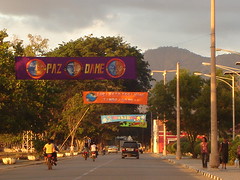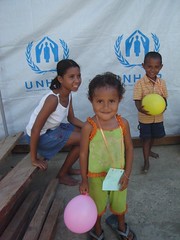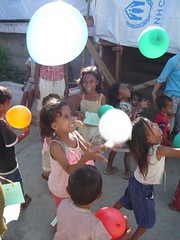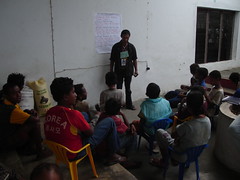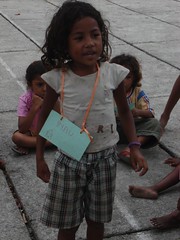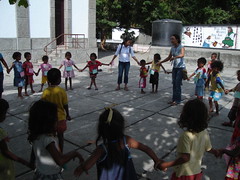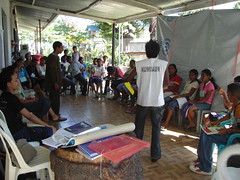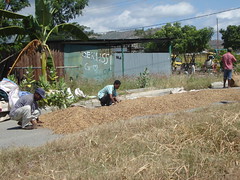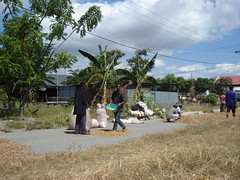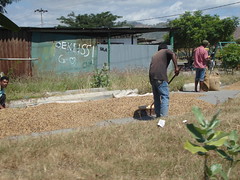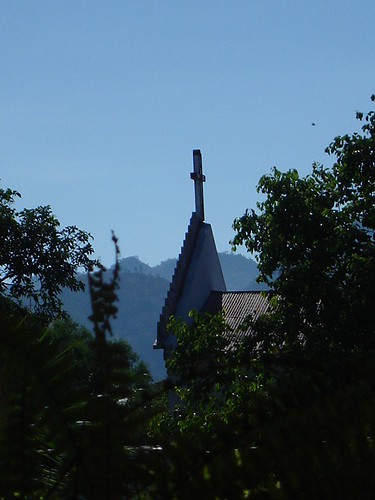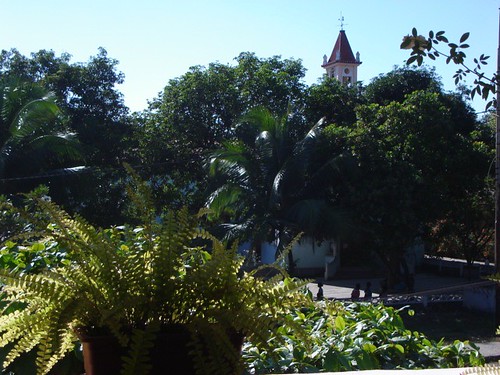politics and pretty things
Alfredo Reinaldo was arrested last week. His story is complicated, and I don’t even fully understand it. But from what I have been told, he was part of the military police who several months ago, in the beginning of the recent conflict, aligned himself with the military staff from the east of Timor who were laid-off, and cited discrimination as the main reason for their dismissal. Reinaldo became the head commander for one group of the petitioners who were supposedly involved in battles in the hills north of Dili, in which an unknown (i.e. unreported) number of people where killed.
So, this part of the story is old news; it happened between the end of February and the end of May. But he was only recently detained due to a weapons cache that was discovered in his house. The government and the international forces had declared a deadline for the submission of all weapons in the country, and the weapons in his house were found after this deadline had passed. The Portuguese GNR (Guarde Nationale de la Republica?) were sent to arrest him, and he now is locked up down the street from our office in the Ministry of Justice.
Many people in Timor have been angered by his detention, hence the recent call for protests. Although they haven’t really materialized, I’ve noticed that all movements of people seem to take several days in this country… for example, a protest called for Monday might actually have people en mass by Thursday. So, it might happen yet.
But, the interesting part is trying to understand why people are so upset. From our experiences with a democracy, we expect that when people are arrested, they subsequently go to trial, and either will be acquitted or proven guilty. Despite many flaws in the system, we accept that justice is partly a matter of time.
Here, people too talk about justice justice justice. The concept is particularly significant because there is an overarching sense that justice was never served for the serious crimes that took place in Timor under Indonesian occupation. Yet, people are furious that Reinaldo has been arrested, and instead of accepting the verdict reached by any court process, have called for his immediate release. Even Timorese I’ve spoken with who don’t personally have an opinion about Reinaldo’s arrest would like him to be freed, if only to prevent more protests and possible violence.
Apparently, people are angry that he was arrested so quickly, while the previous Prime Minister, Mari Alkatiri, who is suspected to be involved in illegally arming people involved with murders of Police in Dili in May, is free and has not yet be charged with any crime. You must remember, too, that there is still an underlying connection with regional tensions, as Reinaldo was supporting Easterners while Alkatiri was mainly supported by Westerners. But, rather than calling for an international investigation of Alkatiri, people want Reinaldo freed? This kind of reasoning, this logic, is honestly lost on Malae.
And the claim that people want to destroy Dili? What would this prove, and how does it help, especially given that over 400 homes were burned in Dili over the past few months and the city is already in desperate need of improvement? This too, we cannot understand. It does not make any sense to us.
It seems that we – Timor versus the Western world – have a different interpretation of what we mean by justice. Fine.
But I think people here have not yet agreed on what they mean by justice, either.
It’s a huge and complicated problem.
But, on the more positive side, the only art school in Dili has filled the city with beautiful hand-painted banners about peace and unity. At least some things are always hopeful.
Tasi Feto Tasi Mane literally translates to Man Sea and Woman Sea, but it means north and south. Timor Ida Deit, Timor is united.
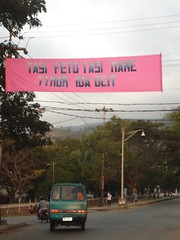
Paz Dame, peace in Portuguese and Tetum
